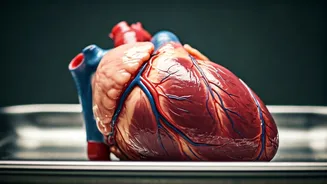Diet and Heart
The intimate link between what you eat and the condition of your heart is a cornerstone of cardiovascular health. A cardiologist has highlighted the importance
of dietary choices in managing and preventing heart disease. The article underscores how specific food types can contribute to the build-up of plaque in arteries, raise blood pressure, and increase overall cardiovascular risk. It stresses that making informed food choices is a proactive step toward maintaining heart health. Dietary adjustments can lead to substantial improvements in heart function and reduce the chances of developing severe heart conditions. A diet designed to support a healthy heart involves reducing or eliminating specific categories of foods, promoting a focus on nutrient-rich options that nourish the cardiovascular system.
Processed Foods Beware
Processed foods are often packed with ingredients that are detrimental to heart health. These foods frequently contain high levels of sodium, trans fats, and added sugars, which elevate blood pressure, increase bad cholesterol levels, and promote weight gain. These effects collectively amplify the risk of developing heart disease. Processed snacks, ready-made meals, and sugary beverages should be limited or avoided. Reading labels carefully to identify hidden sodium, trans fats, and sugars is crucial. Focusing on whole, unprocessed foods like fresh fruits, vegetables, lean proteins, and whole grains is a healthier approach. By avoiding processed items and opting for fresher alternatives, one can significantly improve heart health and diminish the chances of heart-related ailments.
Red Meats and Risk
Consuming excessive red meat is another factor that can increase the risk of heart disease. Red meat is typically higher in saturated fats, which elevate LDL (bad) cholesterol levels. Elevated cholesterol can lead to the formation of plaque in the arteries, narrowing them and increasing the risk of heart attacks and strokes. While moderate consumption might be acceptable for some, the cardiologist advises caution, particularly regarding processed red meats like sausages and bacon, which often contain added sodium and preservatives. Opting for lean protein sources, such as poultry without skin, fish, legumes, and plant-based proteins, is a better strategy for maintaining heart health. Limiting the frequency and portion sizes of red meat can make a notable difference in promoting cardiovascular well-being.
Sugary Drinks' Impact
Sugary drinks are a hidden danger to heart health, contributing to an increased risk of heart disease. Beverages such as sodas, sweetened teas, and fruit juices often have substantial amounts of added sugars, leading to weight gain and insulin resistance. Insulin resistance can contribute to the development of type 2 diabetes, a major risk factor for heart disease. The excess sugar in these drinks can also increase triglyceride levels, another factor that can worsen cardiovascular health. The cardiologist advises substituting sugary beverages with water, unsweetened tea, or sparkling water infused with fruit. These choices not only help maintain a healthy weight but also prevent the negative impacts of excessive sugar on heart function. Making a conscious effort to avoid these drinks contributes greatly to a heart-healthy lifestyle.
Excess Sodium's Role
The role of excessive sodium in the diet must be considered, since it has a direct influence on blood pressure. High sodium intake leads to increased blood volume, which puts extra strain on the heart and blood vessels, ultimately raising blood pressure. Over time, high blood pressure damages the arteries and increases the risk of heart disease, stroke, and kidney problems. Many processed foods, ready-to-eat meals, and restaurant dishes contain high amounts of sodium. The cardiologist suggests reading food labels and choosing lower-sodium options. Cooking at home more frequently and using herbs and spices instead of salt to season foods can also greatly reduce sodium intake, supporting healthier blood pressure levels and protecting the heart.



















